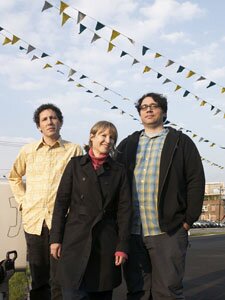CULTURE- Paying off: Yo La Tengo comes of age
James McNew spent some of his formative years in Charlottesville before going off to Hoboken, New Jersey to start Yo La Tengo, which made its way in the world thanks to guitars hewn from gnashing teeth and a healthy sense of humor. After 20 years as the perpetual underdogs of the rock world, the band finally blew the disparity between critical acclaim and mainstream penetration to smithereens with the 2006 release of their zillionth record, which McNew titled I Am Not Afraid Of You And I Will Beat Your Ass.
For reasons unknown, McNew wouldn't field the Hook's interview, but luckily guitarist Ira Kaplan was just as chatty as the album title– and, thankfully, nowhere near as contentious. Until the end, at least...
The Hook: Would you say this record is getting more attention than some of the others you've put out?
Ira Kaplan: I wouldn't, but then I don't pay that much attention to it.
The Hook: Do you feel like your hard work is paying off now more than it was 10 years ago?
Ira Kaplan: That's a funny number. I know you picked it at random, but I would say 10 years ago is when it did start to feel like it was paying off. When we put out I Can Hear The Heart Beating As One, there was a noticeable change in our touring and our shows. I would never have used a phrase like "starting to pay off," because when we worked on the record Painful, that was paying off. That was amazing, creating those songs. Our band's always had a weird trajectory until recently in that every record did just a little better than the one before. We haven't spent 20 years holding on for dear life.
The Hook: Do you feel like Hoboken gets a bad rap?
Ira Kaplan: No, I think it deserves whatever bad rap it gets. It's a sleepy little city next to a gigantic big city. That's one of the things I like about it. Like a lot of places around Manhattan, it's been developed, not very beautifully. Wow, I didn't know my local pride would flare up that way.
The Hook: How long have you been there?
Ira Kaplan: 25 years.
The Hook: Does it figure into Yo La Tengo's identity the way Seattle or Detroit or Athens, Georgia did for their bands?
Ira Kaplan: If you ask those bands from those cities you named, I'm not sure they'd think much of their identity was from the cities. I think sometimes that stuff is more for outsiders than for the people from the cities. But just because I don't think very much doesn't mean it's not true. I've certainly thought that other bands shared characteristics of their cities.
The Hook: Is there anybody you're actually afraid of?
Ira Kaplan: I'm afraid of George Bush.
The Hook: I noticed that you have a running petition on your website seeking to establish ketchup as a national condiment.
Ira Kaplan: I haven't checked the signatures lately, but I feel like the momentum on that important issue has been lost. The midterm elections killed us.
The Hook: Do you remember when Reagan tried to get it classified as a vegetable?
Ira Kaplan: Yeah, I do. But the point is moot, I'm afraid. Similarly noble causes like flag burning amendments end up in the dustbin of history.
The Hook: With that in mind, how do you feel about the responsibility of the artist to be politically aware?
Ira Kaplan: I don't feel that at all, actually. I don't like the idea. I don't think the artist is any more or less responsible than anyone else. It's frustrating to me, the direction our country has gone in, but I can't believe that it's happened for any reason other than that the people are not aware of what they're doing to themselves by voting the way they have. And I don't think artists are any more complicit in that.
The Hook: So it all comes down to the vote, not the voice?
Ira Kaplan: I am uncomfortable talking about my political viewpoint, not because I'm embarrassed by it, but because I don't feel like I can speak authoritatively enough or with enough expertise to make what I have to say more appealing.

Yo La Tengo with the Rosebuds at Starr Hill February 8 (s0ld out). $25/$20, 8pm.
#